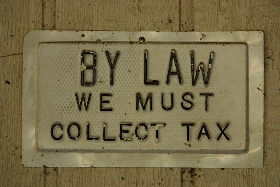So you’re facing an audit and your records, or a portion of them, have gone missing. Or, you’re just a normal entrepreneur chasing from one project to another and your record keeping habits were just, well, not habits at all. You may not be able to produce receipts, bills or other written documentation for all the items on your tax return. That’s when you must turn to reconstructing your records or gathering together the best proof you have for the IRS.
you’re facing an audit and your records, or a portion of them, have gone missing. Or, you’re just a normal entrepreneur chasing from one project to another and your record keeping habits were just, well, not habits at all. You may not be able to produce receipts, bills or other written documentation for all the items on your tax return. That’s when you must turn to reconstructing your records or gathering together the best proof you have for the IRS.
The law does not require perfect record keeping habits—it’s just simpler that way. It’s perfectly legal to reconstruct your records in any way to provide adequate evidence that what you claimed on your return was, in fact, accurate.
 In June 2009 President Obama signed the Consumer Assistance to Recycle and Save Act of 2009 (how much caffeine had they had when they came up with that name?), commonly referred to as "Cash for Clunkers." Auto dealers that signed up for this voluntary program received vouchers for qualifying trade-ins on the purchase off new cars where the fuel efficiency of the new car is better than the fuel efficiency of the clunker. The vouchers were for $3,500 or $4,500 depending on the how much you stepped up in fuel efficiency and they were treated as part of your down payment on your purchase. This applied for the period of Jul 1, 2009 until November 1, 2009.
In June 2009 President Obama signed the Consumer Assistance to Recycle and Save Act of 2009 (how much caffeine had they had when they came up with that name?), commonly referred to as "Cash for Clunkers." Auto dealers that signed up for this voluntary program received vouchers for qualifying trade-ins on the purchase off new cars where the fuel efficiency of the new car is better than the fuel efficiency of the clunker. The vouchers were for $3,500 or $4,500 depending on the how much you stepped up in fuel efficiency and they were treated as part of your down payment on your purchase. This applied for the period of Jul 1, 2009 until November 1, 2009. In June 2009 President Obama signed the Consumer Assistance to Recycle and Save Act of 2009 (how much caffeine had they had when they came up with that name?), commonly referred to as "Cash for Clunkers." Auto dealers that signed up for this voluntary program received vouchers for qualifying trade-ins on the purchase off new cars where the fuel efficiency of the new car is better than the fuel efficiency of the clunker. The vouchers were for $3,500 or $4,500 depending on the how much you stepped up in fuel efficiency and they were treated as part of your down payment on your purchase. This applied for the period of Jul 1, 2009 until November 1, 2009.
In June 2009 President Obama signed the Consumer Assistance to Recycle and Save Act of 2009 (how much caffeine had they had when they came up with that name?), commonly referred to as "Cash for Clunkers." Auto dealers that signed up for this voluntary program received vouchers for qualifying trade-ins on the purchase off new cars where the fuel efficiency of the new car is better than the fuel efficiency of the clunker. The vouchers were for $3,500 or $4,500 depending on the how much you stepped up in fuel efficiency and they were treated as part of your down payment on your purchase. This applied for the period of Jul 1, 2009 until November 1, 2009.




